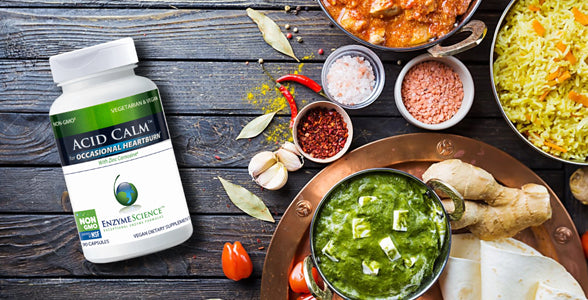
Occasional Heartburn - Naturopathic Solutions for Your Patients
Share
Occasional Heartburn Vs. GERD
Occasional heartburn is common in many people. The NIH estimates that 60 million Americans experience a burning sensation in the chest or an acid taste in their mouths at least once a month. Heartburn can be an occasional symptom associated with heavy meals or alcohol consumption, or it could be associated with GERD.
Gastroesophageal Reflux Disease, or GERD, is diagnosed as heartburn that occurs at least twice a week of sufficient severity to affect quality of life. It occurs when stomach fluids and acids rise into the esophagus and even the throat and sinuses causing irritation and inflammation. GERD is frequently associated with abnormalities of the lower esophageal sphincter (LES) which results in relaxation of the sphincter thus allowing fluids to escape the stomach.

Risk factors for occasional heartburn & GERD include:
- Obesity or being overweight
- Low stomach acid
- Cigarette smoking
- Hiatal hernia
- Eating large meals too close to bedtime
The Standard American Diet (SAD) is strongly associated with occasional heartburn - diets high in fatty foods or animal products and low in plant-based foods, along with increased alcohol consumption. As traditional cultures move to more western diets, occasional heartburn increases accordingly. Specific foods such as coffee, chocolate, citrus fruits, carbonated beverages and alcohol among others are common causes of occasional heartburn.
Commonly used solutions for frequent heartburn include:
- Over the counter (OTC) antacids
- OTC or prescription H2 Blockers
- Proton Pump Inhibitors (PPIs)
- Motility regulators such as Reglan
These products are big business for pharmaceutical companies. They were originally recommended for short-term use in GERD sufferers (no more than 14 days), but it has become increasingly common for people to be on these meds for occasional heartburn for months and even years.
Problems associated with long term use of PPIs
PPIs act on stomach parietal cells to block the production of hydrochloric acid (HCl) which unbinds vitamin B12 from protein, and it blocks the production of intrinsic factor which is necessary for B12 absorption. It has been shown that without HCl, vitamin B12 absorption is reduced by 98%. B12 is critically important for our nervous symptoms. A deficiency of vitamin B12 is linked with cognitive and mood changes, muscle weakness and fatigue, among others.
Long-term PPI use has been shown to cause deficiencies in several vitamins and minerals including vitamin B12, magnesium, and calcium. By reducing stomach acid, PPIs over time weaken the LES which actually worsens one of the basic causes of GERD.
People on long term PPIs have increased risks of hip, wrist and spine fractures, have a 50% greater risk of getting pneumonia, an increased risk of heart attacks in those who have had a first heart attack, and have been linked with a 25% increased chance of early death from all causes. Animal studies have linked use of PPIs with the development of brain amyloid plaques which are linked with Alzheimer’s disease, and studies of elderly people on PPIs vs those who are not show a greatly increased risk of being diagnosed with dementia for long-term PPI users. PPIs have also been linked with Kidney damage, contributing to both acute and chronic kidney disease, which affect over 13% of the US population.
As you can see, PPIs, especially with long term use, increase our risks for a host of medical and health issues. Fortunately, we know that relatively simple diet changes, smoking cessation, maintaining a healthy weight, and eating a whole foods plant-based diet along with appropriate support from supplementation work well to prevent and reverse GERD effectively without the use of harmful medications.
Are there other effective ways to treat occasional heartburn and GERD?
In my naturopathic medical practice, I see people with occasional heartburn on a daily basis. Treatment includes addressing causal factors, correcting lifestyle factors including attention to diet, and use of specific enzyme-based formulas to improve stomach health and digestion as well as soothing and supporting irritated tissues. I also incorporate herbal and nutritional supplements, and appropriate weaning from prescription medications. Elimination of PPIs can be challenging,
For enzyme–based formulas Acid Calm™ is my “go-to” choice.
In conclusion, there are many useful strategies for addressing occasional heartburn that allow for people to avoid long term harm, while improving their health and accelerating the healing process.
Carl Hangee-Bauer, ND, LAc
Clinic Director, San Francisco Natural Medicine

